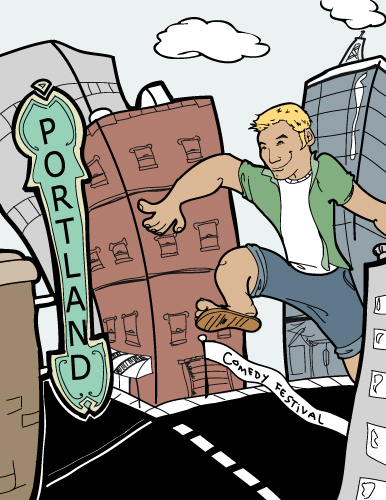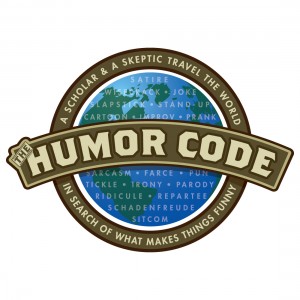As part of my global expedition that explores what makes things funny, Joel Warner and I are grilling humorists about the science behind scoring laughs.
For a long, long time, Portland’s comedy scene was anemic. No “A-room” comedy clubs, no big comedy bookers, no national buzz. That changed in 2008, however, with the launch of the city’s Bridgetown Comedy Festival, which featured 50 comedians and headliner Patton Oswalt. The following year, the festival was considerably bigger, and a year after that, bigger still.
Now, it’s considered one of the hottest comedy events in the country, with this year’s festival, running from April 12-15, boasting hot acts like Eric Andre, Doug Benson, Maria Bamford, Amy Schumer and Myq Kaplan. (Full disclosure: The Humor Code will be there, too, hosting a presentation on the science of comedy.)
There’s no question Portland is now firmly established on the national comedy map — and the credit goes largely to Andy Wood, an electrical engineer turned comic who helped launch Bridgetown and has served as its producer since. But success hasn’t gone to Wood’s head. He’s still plugging away at his stand-up career, and during this year’s festival, you’ll find him trading sets with comedians he’s invited from all over the country.
We wrangled a few minutes out of Wood’s busy pre-festival schedule to grill him about the pros and cons of Bridgetown blowing up, how engineering instructs his joke construction, and why alpha males aren’t funny.

Humor Code: Why start the Bridgetown Comedy Festival? What are you trying to accomplish?
Andy Wood: When we started the festival, I don’t think any of us pictured it growing into what it has become. It was a small-scale idea. As a relative newcomer to stand-up and a lifelong comedy fan, I was frustrated at the lack of attention the comedy scene in the Northwest was getting. Selfishly, I also really wanted to see my favorite comics perform live in my city, and that wasn’t happening much at that time. Matt Braunger, Kimberly Brady and I put our heads together and came up with a list of comics we all liked, and it was surprisingly easy to get them up to Portland to perform.
I don’t think we were trying to accomplish anything beyond throwing a big party of sorts and turning people on to some performers we thought were great.
Humor Code: How did being a comedian inform how you wanted to run your festival? What had other festivals always done wrong, from your perspective?
Wood: It was a blessing and a curse that I’d not only never performed in a comedy festival before starting Bridgetown, but I’d never even been to one. I just looked at the problem of how to organize a festival from the standpoint of a comedy fan: How would I want this thing to be laid out to make it the most fun to attend, and to maximize the comedy that I could see in a weekend? It’s probably easier to start from square one like that rather than seeing how someone else has tackled the problem and trying to reverse engineer it.
Some of the things people have told us they like about Bridgetown that separates it from other festivals are the close proximity of all the venues, the affordability of the tickets, the wide range of acts, and the fact that we have a ton of fun activities for the comics to do together outside of the shows they’re performing on. That last part might be the most important factor in the festival’s success. A lot of comics say this is the most fun weekend of their year and that it’s like a giant summer camp for comedians.
Humor Code: For comics, what are the major differences between performing at a big festival like this and doing regular shows? Are some comedians better at one or the other?
Wood: Comedians who have been to Bridgetown say they have a good time because they’re in the company of their peers, the fans are rabid, and it’s a low-pressure situation. The lack of industry frees people up a bit and lets them do the kind of act they want to do. I think it has a much different feeling from doing a weekend of shows at a comedy club, where half the audience might have been coerced into coming, and the other half is just there for a bachelorette party and is drunk before the show starts.
Most comics I’ve seen at Bridgetown are at their best in a festival environment, but as our event grows and starts to have more of an industry presence, there’s a risk of that changing. I’m not sure how to avoid that, because we want industry there to discover new talent, but we also want all the performers to have a good time and be free in the choices they make onstage.
Humor Code: Before becoming a comedian, you were an engineer. How does your engineering background inform your work in comedy?
Wood: It definitely informs my work on the festival. The four months leading up to Bridgetown every year taxes both sides of my brain in equal amounts, which is fun for me. Well, maybe “fun” isn’t the right word. I guess it just makes me feel less lazy about the left-brain atrophy that I go through the rest of the year. I was never the best engineer when that was my full-time job, and I’m far from the best comedian, but I’m decent at both, which might be a rarer thing than being really good at either. That comes in handy when we’re trying to solve the hundreds of logistical problems that come up when you run a festival with 240 comedians performing on 12 stages in one weekend.
As a performer, my engineering background makes me approach joke-writing more analytically, and it affects my tastes as a fan of comedy. I can’t tolerate comedy that’s based on a faulty premise, for instance — in fact that’s one of my biggest stand-up pet peeves — and I’m sure that’s because of the engineer in me.
Humor Code: If folks are coming to your festival to try to spot the next big thing in comedy, what should they be looking for? What comic characteristics do you think indicate a shot at the big time?
Wood: A consistent, well-defined voice is as good an indicator of success as anything else. Audiences respond best when you inspire confidence in them — when they know they’re in good hands and can sit back and trust that you know what you’re doing. Even when someone’s onstage persona is intentionally timid or low status, if the comic does it well, the audience can tell that he’s in control, and they’ll respond. That kind of confidence can make up for a lot of deficiencies, but when you also combine it with strong, original writing, that makes for an unstoppable comic.
Humor Code: Were you born funny, or did your funniness come from practice and development? Does good comedy have to come from a screwed-up childhood?
Wood: I wasn’t born funny, and I don’t think anybody is. I always had a love for stand-up comedy growing up, and that, combined with a dash of middle-child syndrome, is probably what pushed me into stand-up. I don’t think comedy requires a screwed-up childhood, but you don’t find a ton of great comics who were alpha males and females in their social circles growing up, so it certainly helps to have been an outcast in some fashion in your formative years.
Comedy does come from practice and development, even if you’re not conscious of the fact that you’re developing it. Some people are forced by their circumstances to start doing that at an early age, which obviously gives them a huge advantage later in life if they want to pursue a career in comedy.
Humor Code: How could the comedy industry do better at finding, fostering, and promoting new talent?
Wood: Um, come to the Bridgetown Comedy Festival? Come on. That one’s a layup.
I do think that our selection committee does a decent job of reviewing the hundreds of applicants to the festival objectively. We don’t read people’s bios and resumes first; we just watch the tapes. We try not to be influenced by managers, social obligations, et cetera, and pick the lineup based on whether the performances make us laugh.
As somewhat of an outsider to the comedy industry in general, I can’t speak to how networks and other festivals make their talent decisions, but I sometimes get the feeling that performers are championed not because any decision maker was blown away by them, but because they thought they knew how to sell them. That seems backwards to me. Why not get behind people who actually inspire you?
Read the full post at The Humor Code
—————————————————-
For more about the Humor Code, check our:
Web page.
Facebook page.
Twitter account.
Wired blog.
Huffington Post blog.
Psychology Today blog.
